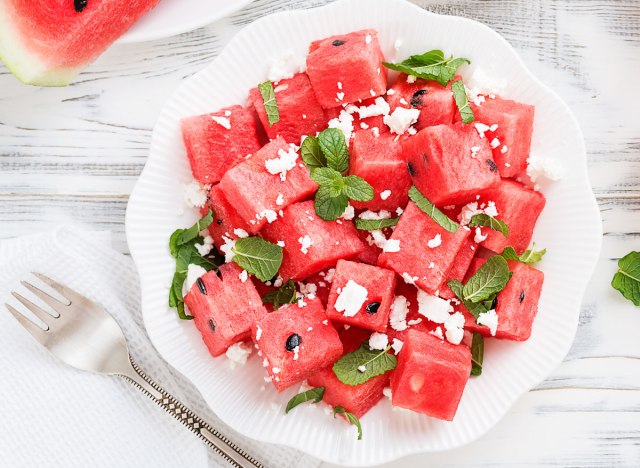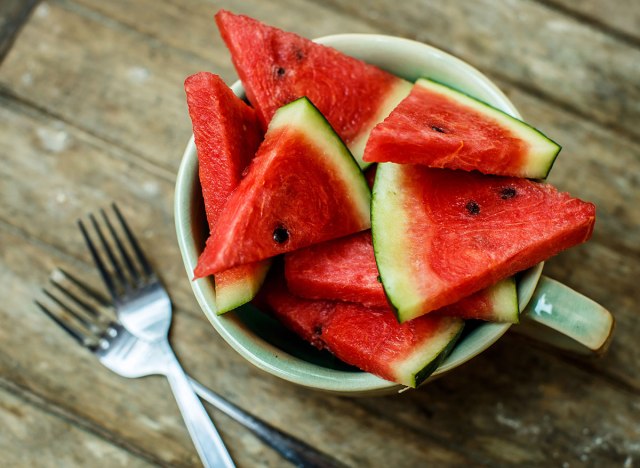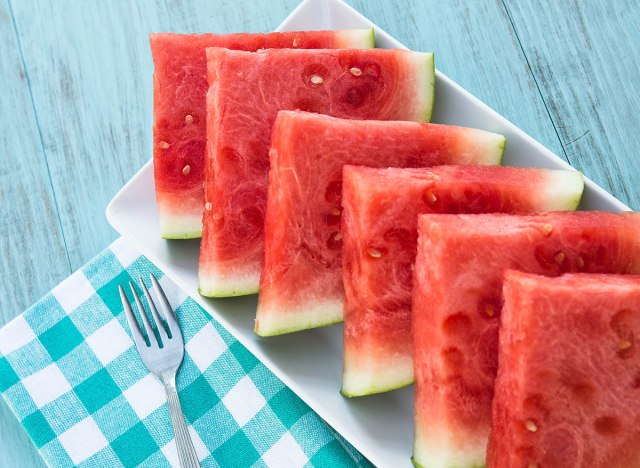One Major Effect of Eating Watermelon This Summer, Says Science
There’s nothing quite as satisfying as sinking your teeth into a plump and juicy watermelon wedge, especially when it’s over 80 degrees outside.
Aside from nibbling on a chilled wedge, there are so many fun ways to enjoy watermelon in the summer. For example, you can grill the wedge along with other BBQ favorites, or cube the melon and make a salad with feta cheese, balsamic vinegar, and fresh mint. You could even blend the fruit into a refreshing juice to enjoy either by itself or as a mixer with your alcohol of choice. Also, have you heard of watermelon seed butter? 88 Acres sells the seed butter in either jars or individual packets!
- Advertisement -
Anyways, there are so many reasons to eat watermelon, the most important of which is that it can help you stay hydrated during the scorching hot summer months. After all, 92% of the fruit is water, which can help you tolerate the heat and keep you full. But that’s not the only perk to this juicy fruit.
Here are three other health benefits of eating watermelon as well as one potential pitfall to watch out for!
It may alleviate muscle soreness.
Hopefully, you have lots of outdoor activities planned this summer, including swimming at a pool or beach, hiking, biking, tossing a frisbee, playing volleyball—the list goes on. With so many excuses to be physically active with friends, you may become sore from all of the exercises. Did you know that watermelon can actually help you recover from all of your active endeavors? The fruit contains a specific amino acid called citrulline that may help relieve muscle soreness. One small 2013 study found that when athletes were given plain watermelon juice, watermelon juice mixed with citrulline, or citrulline drink, those who were given either watermelon beverage experienced less muscle soreness and a quicker heart rate recovery, compared to those who just had the citrulline drink.
It may lower inflammation in the body.

Chronic inflammation can lead to myriad health issues, the worst of which include chronic diseases such as heart disease, Alzheimer’s disease, and diabetes. Watermelon may assist in reducing inflammation levels throughout the body.
Rich in antioxidants lycopene and vitamin C, the fruit may also play a key role in lowering oxidative damage done to cells. In an animal study, rats were fed watermelon powder to supplement an unhealthy diet. Compared to the control group, the rats that received the supplement had developed lower levels of the C-reactive protein (an inflammatory marker) and less oxidative stress. Here’s to repairing your body this summer with watermelon recipes!
It may improve digestion.

Since watermelon is so hydrating it can help to loosen stool, allowing you to go to the bathroom with ease. In addition, watermelon does contain a small amount of fiber (about 1 gram for a wedge, per the USDA), which can add bulk to your stool and help it move through your digestive tract.
It could trigger a migraine.

One downside to watermelon is that it may cause a migraine in those who are susceptible. A recent study revealed that the fruit—as well as others including pineapple, passion fruit, and banana—is a migraine trigger. Within minutes, 29.5% of the 4,000 migraine subjects included in the study experienced a migraine after eating watermelon. For context, the second-worst fruit, passion fruit, only caused migraines in 3.7% of participants. If you’re sensitive to tension headaches or migraines, you may want to avoid watermelon unless instructed otherwise by your doctor.
For more, be sure to check out Here’s What Happens To Your Body When You Eat Watermelon Every Day.
The post One Major Effect of Eating Watermelon This Summer, Says Science appeared first on .
